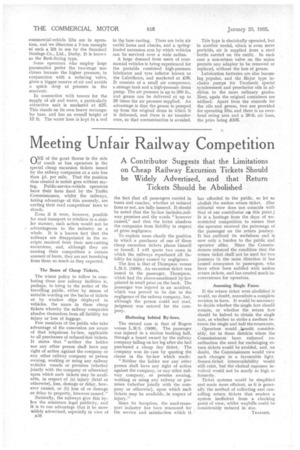Meeting Unfair Railway Competition
Page 56

If you've noticed an error in this article please click here to report it so we can fix it.
A Contributor Suggests that the Limitations on Cheap Railway Excursion Tickets Should be Widely Advertised, and that Return Tickets Should be Abolished
ORE of the great thorns in the side of coach or bus operators is the special cheap excursion tickets issued by the railway companies at a rate less than id. per mile. That the position thus created is unfair goes without saying. Public-service-vehicle operators have their fares fixed by the Traffic Commissioners, whilst the railways, taking advantage of this anomaly, are cutting their road competitors' fares to shreds.
Even if it were, however, possible for road transport to retaliate in a similar manner, such action would not be advantageous to the industry as a whole. It is a known fact that the railways are disappointed in the receipts received from their rate-cutting excursions, and, although they are causing their competitors a certain amount of harm, they are not benefiting from them £0 much as they expected.
The Snare of Cheap Tickets.
The wisest policy to follow in combating these new railway facilities is, perhaps, to bring to the notice of the travelling public, either by means of suitable wording on the backs of tickets or by window slips displayed in vehicles, the snare in these cheap tickets whereby the railway companies absolve themselves from all liability for injury or loss of luggage.
Few members of the public who take advantage of the concession are aware of that iniquitous by-law, applicable to all purchasers of reduced-fare tickets. It states that "neither the holder nor any other person shall have any right of action against the company or any other railway company or person owning, working or using any railway vehicles vessels or premises (whether jointly with the company or otherwise) upon which such tickets may be available, in respect of (a) injury (fatal or otherwise), loss, damage or delay, however caused, or (h) loss of or damage or delay to property, however caused."
Naturally, the railways give this bylaw the minimum legal publicity, and it is to our advantage that it be more widely advertised, especially in view of
B38 the fact that all passengers carried in buses and coaches, whether at reduced fazes or not, are fully insured. It should be noted that the by-law includes jailwaypremises and the words "however caused," and that the latter absolves the companies from liability in respect of gross negligence.
To explain more clearly the position in which a purchaser of one of these cheap excursion tickets places himself or herself, I will quote two cases in which the railways repudiated all liability for injury caused by negligence.
The first is that of Thompson versus L.M.S. (1930). An excursion ticket was issued to the passenger, Thompson, which had the above-mentioned by-law printed in small print on the back. The passenger was injured in an accident, which was proved to be due to the negligence of the railway company, but, although the person could not read, judgment was entered for the company.
Sheltering behind By-laws.
The second case is that of Rogers versus L.M.S. (1930). The passenger was injured in a station booking hall, through a board owned by the railway company falling on her leg after she had purchased a cheap day ticket. The company won its case by quoting the clause in the by-law which reads :
"Neither the holder nor any other person shall have any right of action against the company, or any other railway company, or persons owning, working or using any railway or premises (whether jointly with the company or otherwise), upon which such tickets may be available, in respect of injury."
Since its inception, the road-transport industry has been renowned for the service and satisfaction which it has afforded to the public, so let us abolish the useless return ticket. (Our editorial view does not coincide with that of our contributor os this point.) It is a heritage from the days of unrestricted competition to ensure that the operator received the patronage of the passenger on the return journey. It has outlived its usefulness and is now only a burden to the public and operator alike. Since the Commissioners enforced the condition that the return ticket shall not be used for two journeys in the same direction it has caused annoyance to passengers, who have often been saddled with useless return tickets, and has created much inconvenience for operators.
Assessing Single Fares.
If the return ticket were abolished it would, no doubt, necessitate a complete revision in fares. It would be necessary to decide whether the single fare should remain, or whether the return fare should be halved to obtain the single rate, or whether to strike a medium between the single and half the retunirate.
Operators would benefit considerably, for in those districts where the Commissioners have enforced coordination the need for exchanging return tickets would be avoided, and, no doubt, the Commissioners would view such changes in a favourable light. Season-ticket interavailability would still exist, but the clerical expenses involved would not be nearly so high as formerly.
Ticket systems would be simplified and made more efficient, as it is generally the method of collecting and cancelling return tickets that renders a system inefficient from a checking point of view, whilst waybills could be considerably reduced in size.
TRANSEX.




































































































